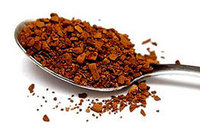Instant coffee at work? No way!
 According to statistics, 2.5 billion cups of coffee is drunk in the world these days. Most of these cups contain instant coffee. The popular drink was invented by a Swiss chemist Max Morgentaller. He took over the experiments of his Japanese colleague Satori Kato, who invented the technology for the production of powdered tea. The date of birth of instant coffee is July 24, 1938. However, at the time neither the experts nor the consumers appreciated the taste, flavor and convenience of instant coffee.
According to statistics, 2.5 billion cups of coffee is drunk in the world these days. Most of these cups contain instant coffee. The popular drink was invented by a Swiss chemist Max Morgentaller. He took over the experiments of his Japanese colleague Satori Kato, who invented the technology for the production of powdered tea. The date of birth of instant coffee is July 24, 1938. However, at the time neither the experts nor the consumers appreciated the taste, flavor and convenience of instant coffee.
Currently, there are many companies producing various types of instant coffees. You can brew coffee in powder, granules, freeze-dried, of buy bags of "3 in 1". The main difference between them is the production technology. Keep in mind that no technology of processing coffee beans into a soluble substance is complete without the heat treatment that kills all the beneficial properties of coffee.
There are several ways of packing instant coffee. The container can tell you about the quality of the content. For example, cans usually contain cheaper coffee and may even make the taste of coffee "metallic". Quality instant coffee, which is granulated and freeze-dried coffee, is packed in glass jars. Glass is considered more prestigious packaging, capable to maintain the aroma and taste of instant coffee.
The content of coffee beans in instant coffee is minimal. As a rule, it is about 15% of the composition. In addition, the quality of these grains can often be highly questionable. Many coffee factories that specialize in "real" coffee beans pass the "bad" grain to the producers of instant coffee. Although many manufacturers claim that they use Arabica for instant coffee, they actually use the cheaper variety - robusta, since the use of arabica is uneconomic. Plus, this variety contains much more caffeine.
Powder method of coffee production is the cheapest. Raw coffee is cleaned, roasted and crushed into tiny particles of 1.5-2 mm. The last stage of preparation is cooling of the obtained powder mass.
Agglomerated instant coffee is better known as granular. The main difference is that the powdered coffee is whipped into tiny lumps by steam. The intense pressure changes the molecular structure of the grain and has an adverse effect on the taste and color of the beverage.
And finally, the sublimation. Simply put, it is drying out frozen product in a vacuum. This method is the most expensive. Supposedly, it keeps the original properties of natural coffee. Yet, coffee is brewed for a few hours, which kills all its useful properties.
Of course, we drink coffee to a) to cheer up, b) to enjoy the flavor. What can we eventually get if the share of the grains accounts for only 15% of the composition? Only dyes and artificial flavors. Choose high-quality instant coffee to cause less damage to the body.
Real and instant coffee cannot be compared. Caffeine is a grain beverage, and leaves the body several hours later. The same dose of caffeine contained in instant coffee will be released in approximately 10 hours, while the invigorating effect of the beverage lasts only two or three hours. Regular consumption of instant coffee could easily lead to an overdose of caffeine that will harm your health.
Many believe that caffeine-free instant coffee is less harmful. However, this view is a fundamental mistake. This product contributes to the deposition of kidney stones.
Coffee itself is a potent stimulator of gastric juice and instant coffee contains acid. Therefore, people suffering from stomach diseases should not drink coffee on an empty stomach. At the very least, it should be mixed with milk. It is also not recommended for people with cardiovascular diseases to abuse instant coffee.
Doctors advise women to abstain from instant coffee. The preservatives in it negatively affect the metabolism, causing the appearance of cellulite.
The smell of instant coffee, which is so often emphasized by manufacturers in their advertising campaigns, is perhaps the only useful property of the instant beverage.
Instant coffee, of course, has its advantages. Yet, according to scientists and physicians, they are purely about convenience: this coffee is convenient to store and it brews quickly. In today's hectic lifestyle the ease of preparation is a deciding factor, but you should not forget about your health.
Now, many companies produce ground coffee beans that can be brewed in a cup. It will not dissolve, will retain its useful properties, and will not harm your health.
Scientists are unanimous about one thing: if there is a choice between tea and instant coffee in the workplace, choose tea.
Sleta Marina
Medpulse
Subscribe to Pravda.Ru Telegram channel, Facebook, RSS!





